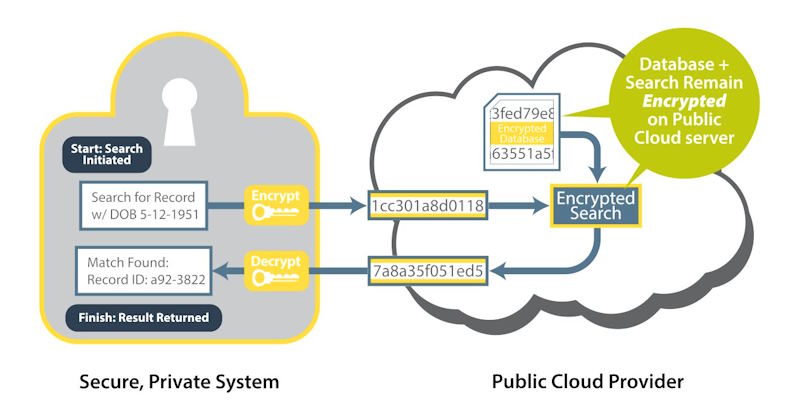
Real-World Use Cases for Fully Homomorphic Encryption
As the digital landscape continues to evolve, so do the threats to data privacy and security. The need for innovative encryption solutions that can withstand sophisticated cyber threats while preserving the integrity and confidentiality of information has never been more critical. Fully Homomorphic Encryption emerges as a beacon of hope in this dynamic scenario, offering a groundbreaking approach to secure data processing. By allowing computations on encrypted data without the need for decryption, FHE opens up possibilities for secure cloud computing, confidential healthcare data management, protected financial transactions, privacy-preserving machine learning, and collaborative research with enhanced data security.
Real-World Use Cases: Unlocking the Potential of Fully Homomorphic Encryption
Securing Cloud Computing
The exponential growth of cloud computing has brought unparalleled flexibility but also raised concerns about data security. Traditional encryption methods often face challenges in protecting sensitive information during computation. Fully Homomorphic Encryption (FHE) emerges as a game-changer, addressing cloud computing security challenges by allowing computations on encrypted data without the need for decryption. This ensures end-to-end security, making it significantly harder for potential threats to exploit vulnerabilities. Notable examples of FHE implementation in cloud services include secure data processing in multi-party collaborations, enabling confidential computations without exposing raw data to external parties.
Confidentiality in Healthcare
In the healthcare sector, where safeguarding patient data is of utmost importance, FHE offers a robust solution to current data security concerns. FHE applications in healthcare systems enable secure processing of sensitive patient information while maintaining confidentiality. The benefits are evident in scenarios where medical researchers and practitioners need to perform computations on encrypted patient records without compromising individual privacy. Despite challenges such as computational overhead, the adoption of FHE in healthcare promises a transformative approach to balancing data security and information sharing.

Financial Data Protection
Financial institutions face constant threats to the security of transactional data. FHE steps in to fortify financial data protection by allowing secure computations on encrypted financial transactions. This ensures that sensitive information remains confidential throughout the processing pipeline. Real-world examples highlight how FHE adoption in the financial sector has strengthened the security posture, offering a compelling case for other industries grappling with similar vulnerabilities.
Privacy-Preserving Machine Learning
The growing importance of data privacy in machine learning makes FHE a key player in enabling privacy-preserving machine learning models. FHE’s unique capability to process encrypted data while maintaining privacy opens new avenues for machine learning applications. Case studies showcase successful integrations of FHE in machine learning environments, emphasizing its role in advancing data-driven technologies without compromising individual privacy.
Secure Data Sharing in Research
Collaborative research often involves sharing sensitive data, posing challenges in maintaining confidentiality. FHE emerges as a reliable solution for secure data sharing, allowing researchers to perform computations on encrypted data without exposing raw information. Examples of FHE implementation in collaborative research projects underscore its potential to revolutionize data sharing practices, fostering innovation while safeguarding intellectual property and individual privacy.

Challenges and Considerations: Navigating the Path to Fully Homomorphic Encryption
Performance Considerations
Fully Homomorphic Encryption (FHE) introduces a paradigm shift in data security, but it is not without its challenges. One significant concern is the computational overhead associated with FHE, as performing operations on encrypted data inherently requires more computational resources than traditional methods. However, the field is rapidly advancing, with ongoing research focusing on optimizing FHE performance. Innovations in algorithms and hardware acceleration techniques are alleviating the computational burden, making FHE more viable for real-world applications. These strides in performance optimization are crucial for ensuring that FHE remains practical and scalable across diverse industries.
Adoption Challenges
While the potential of Fully Homomorphic Encryption is immense, its adoption faces several challenges. One notable obstacle is the limited awareness and understanding of FHE among organizations and individuals. Overcoming this hurdle requires comprehensive education efforts to bridge the knowledge gap and showcase the practical benefits of FHE. Additionally, regulatory considerations and compliance issues pose significant barriers to adoption. Navigating the complex landscape of data protection regulations is essential for ensuring that FHE implementations align with legal requirements and industry standards, fostering a secure and compliant environment for the widespread adoption of this transformative encryption technology. As the technology matures and awareness grows, addressing these challenges will be pivotal in unlocking the full potential of Fully Homomorphic Encryption.


